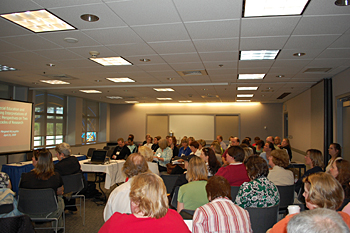
“Given the shift in federal and state educational policies in the last several years, especially as evidenced in the alignment of the No Child Left Behind Act and the Individuals with Disabilities Education Act, we thought the symposium would serve as an excellent vehicle for examining the changing relationship between general and special education,” said Laura Eisenman, UD associate professor of education, a co-organizer of the symposium.
Though the Individuals with Disabilities Education Act ensures students with disabilities receive a free and appropriate education, it does not ensure positive student outcomes. With the No Child Left Behind Act, students with disabilities must be included in state assessment measures. This has heightened awareness of educational disparities, as schools work to implement school-wide systems change to effectively support all students.
Ralph Ferretti, a professor in the School of Education and the Department of Psychology, organized the symposium with Eisenman. “The No Child Left Behind Act sets out to eliminate a seemingly intractable achievement gap disadvantaging diverse learners, including students with disabilities," Feretti said. "Proponents of the law argue that high-quality instruction, coupled with challenging academic standards and rigorous assessments, will close the gap.”
Ferretti noted, “Questions have been raised about how best to prepare special and regular educators to achieve this ambitious goal, how to assess students' academic performance and how to relate these assessments to decisions about eligibility for special education services.”
To help address these questions, the symposium assembled a panel of experts from across the nation, including: Alfredo Artiles, professor of special education, Arizona State University; Mary Brownell, professor of special education, University of Florida; Mary Beth Bruder, professor, University of Connecticut and director, A. J. Pappanikou Center for Developmental Disabilities; Sherman Dorn, associate professor, University of Florida; Doug Fuchs, professor, Vanderbilt University; and Margaret McLaughlin, professor, University of Maryland at College Park and associate director, Institute for the Study of Exceptional Children.
“The speakers brought a wealth of knowledge and experience in special education to bear on the most critical issues facing special education today,” said Nancy Brickhouse, director of the School of Education. “The content was both scholarly and practical. I anticipate its impact will be local due to the participation of Delaware educators, as well as national via the broad distribution of the papers written for the forum.”
These papers addressed a range of topics including the disproportionality of minority students in special education, issues of student equity and its relationship to special education, and an evolving model of instruction--known as response to intervention--and its implications for the identification process for special education.“Dr. Eisenman and Dr. Ferretti compiled a slate of scholars and experts who bring a depth of understanding about special education in the 21st century and challenge the field to address the most important issues of the day,” said Michael Gamel-McCormick, interim chairperson of the Department of Individual and Family Studies and director of the Center for Disabilities Studies at UD. “This was a wonderful opportunity for the Delaware educational community to interact with national leaders in the field of special education.”
The symposium was made possible with support from the National Research Center on Learning Disabilities and the following College of Human Services, Education, and Public Policy divisions and affiliates: the School of Urban Affairs and Public Policy, the Department of Individual and Family Studies, and the Center for Disabilities Studies.
For more information, or to obtain copies of papers presented at the symposium, contact Eisenmen [eisenman@udel.edu] at (302) 831-0532 or Ferretti at [ferretti@udel.edu] or (302) 831-1644.
Article by Johanna Homan
Photo by Tracy Mann


